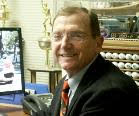An evolving vision for personal transportation, parking and land-use
The notion that virtually anyone will be able to afford a chauffeur, seems ridiculous. But then again, ten years ago, only a few experts and visionaries saw a future where most everyone would have personal assistants that listen to and respond with information that ranges from arcane to life-saving. The combination of automation, connectivity, electrification and sharing is going to revolutionize transportation in a way that is similar to how the smart phone has transformed communications and computing.
Princeton’s Dr. Alain Kornhauser is one of those experts who has seen and been working on the future of mobility for many decades. Kornhauser will provide a broad overview of the current state of automating the transportation experience, the hurdles that must be overcome and how we get to a world where a “personal chauffeur” is more typical than not.
In addition to impacting the way we move from place-to-place, autonomous vehicles will change land-use. For instance, when a vehicle can park itself (as Teslas will be able to later this year), the need to closely couple parking with living space may go away; this is significant, as some estimate that 1/3 of the land in a typical urban area is set aside for vehicles through roads and parking. Southern Illinois University’s Assistant Professor Shannon Sanders McDonald, AIA, who wrote the book on the parking garage, will address the impact autonomy will have on land-use. and the “built-environment”.
Questions to consider include:
- Apple, Google, Uber, GM, Mercedes, Toyota, etc. – is it a car or a smart phone?
- The promise of autonomous vehicles have been a dream since the 1930s, why now?
- Yeah, but what are the benefits to adding autonomy to a transportation network?
- Great, it may be self-driving, but who is going to insure what is effectively a mobile robot?
- The nun or baby stroller – what are the difficult questions that have to be addressed, whether ethical, privacy, legal, etc?
- How can we create a “built” environment today that will accommodate the impacts of autonomous vehicles that may be years or decades off?
- What does autonomous vehicles mean for how we think about alternative forms of mobility, whether walking, bicycling, rail?
- Just as the parking garage was a new structure to accommodate the automobile, what sort of new structures are envisioned to accommodate autonomy?
- The culture of control. (of the vehicle, of when, of where, etc.)
- Do we expect different cultural acceptance or adoption in highly urban areas where the shift is from Cab to autonomous vehicle?
- What is the tipping point for autonomous vehicles to be impactful?
- 15 million new cars are sold annually in the US.
- What’s the plan for jobs and when do we need to begin transforming the automotive industry?
- Who is liable in a “suit happy society”. e.g. I’m late for or miss an appt. and get charged for the appt.
- Since the roadways need to provide control systems, should autonomous vehicles be part of a public transportation system or a private system…or both.
- How does private use pay for infrastructure?
About Alain Kornhauser, PH.D.
 Starting with his early work in the space program and continuing with commercial work as a pioneer in Global Positioning Systems (GPS), Kornhauser has been involved with transportation technologies that have changed the way we see and move around in our world. As a professor at Princeton, his influence extends through the numerous graduates. His weekly email newsletter, Smart Driving Car, provides a round-up of current events regarding the automation of transportation. His concise and razor-sharp analysis is a must-read for anyone interested in the future of mobility.
Starting with his early work in the space program and continuing with commercial work as a pioneer in Global Positioning Systems (GPS), Kornhauser has been involved with transportation technologies that have changed the way we see and move around in our world. As a professor at Princeton, his influence extends through the numerous graduates. His weekly email newsletter, Smart Driving Car, provides a round-up of current events regarding the automation of transportation. His concise and razor-sharp analysis is a must-read for anyone interested in the future of mobility.
Click here to see an interview with Kornhauser.
 About Shannon Sanders McDonald, AIA
About Shannon Sanders McDonald, AIA
Shannon Sanders McDonaldi s a practicing architect licensed in Pennsylvania, Georgia, Maryland and Illinois; as well as an author of The Parking Garage: Design and Evolution of a Modern Urban Form published by the Urban Land Institute, the basis for an exhibit House of Cars at the National Building Museum. She is an Assistant Professor of Architecture at Southern Illinois University. Co-organizer of the Envisioning Automated Vehicles within the Built Environment: 2020, 2035, 2050 Ancillary Workshop to the TRB Automated Vehicles Symposium 2014 and TRB AUVSI Automated Vehicle Workshop 2015.


